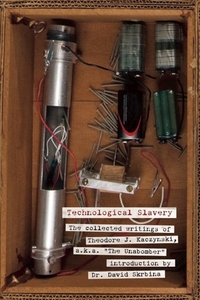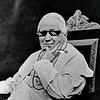You need to sign in or sign up before continuing.
Take a photo of a barcode or cover
13 reviews for:
Technological Slavery: The Collected Writings of Theodore J. Kaczynski, a.k.a. The Unabomber
Theodore John Kaczynski, David Skrbina
13 reviews for:
Technological Slavery: The Collected Writings of Theodore J. Kaczynski, a.k.a. The Unabomber
Theodore John Kaczynski, David Skrbina
informative
inspiring
reflective
medium-paced
Kaczynski points towards problems that are already known such as tech taking away our freedom, environmental degradation, psychological issues, etc. but I don’t buy his solution of going back to the simpler life by uprooting the technological system. Marxism offers a better way forward—transcend capitalism, make tech work for us, and build a fairer society.
What can I say.. Ted Kaczynski is an extremist, and a murderer, and he really dislikes the lefties.
But he's also kinda right (with a big emphasis in the -kinda- part). I feel that today, 2022, what he says is more relevant than ever.
Despite its flaws, this was one of the most thought-provoking books I've ever read.
But he's also kinda right (with a big emphasis in the -kinda- part). I feel that today, 2022, what he says is more relevant than ever.
Despite its flaws, this was one of the most thought-provoking books I've ever read.
It's difficult to imagine a person reading this book attentively and not having their outlook on life fundamentally changed. The ideas on psychology and technology expounded upon in this book are fantastic and explain a lot.
An absolute must read I think for literally everyone. Even if you don't agree that industrial society needs to be destroyed it is a fantastic book to wrestle with.
P.S: I have absolutely zero interest or support for his 'extra-curricular' activities, and they have no bearing on the quality of the work. If you're reading this because you think it'll be 'cool to see inside the mind of a terrorist' or something like this you will be disappointed. The book is well written, ordered, intelligent and not at all some incomprehensible and entertaining screed of a lunatic.
An absolute must read I think for literally everyone. Even if you don't agree that industrial society needs to be destroyed it is a fantastic book to wrestle with.
P.S: I have absolutely zero interest or support for his 'extra-curricular' activities, and they have no bearing on the quality of the work. If you're reading this because you think it'll be 'cool to see inside the mind of a terrorist' or something like this you will be disappointed. The book is well written, ordered, intelligent and not at all some incomprehensible and entertaining screed of a lunatic.
challenging
dark
reflective
slow-paced
informative
reflective
slow-paced
informative
inspiring
reflective
medium-paced
Kaczynski’s newer writings do not get enough attention. Technological Slavery expands upon Kaczynski’s original writings from the 1970s and Industrial Society and Its Future (which is featured in this book as well) by introducing new ideas such as those found in “The System’s Neatest Trick”, “Why Democracy became the Dominant Political Form” (Appendix Three), while also fleshing out some of his ideas in the manifesto in “Letter to Dr. P.B. on the Motivations of Scientists”, “On Learned Helplessness”, and many other sections.
One of the most incredibly eye-opening sections was the aforementioned “Why Democracy became the Dominant Political Form” (Appendix Three). This piece teaches a valuable lesson that reveals the true nature of political institutions and of “developed” nations in general. Kaczynski launches a simultaneous attack against the do-gooder civilized politically minded types and the global power elite which uses “democracy” as a guise to spread economic control and spreading corporate hegemony across the world. To Kaczynski, nations did not simply adopt a democratic form of government to be more “moral” or to “help the people''; it was done in an effort to increase technological, economic, and ultimately military power. Kaczynski gives a great analysis of the history of Western democratic nations that eventually advanced to become the forerunners of the world-wide geopolitical sphere (i.e. Great Britain, the United States). He notes how the semi-democratic England advanced far beyond mainland authoritarian nations and created a vast colonial empire that was able to extract vast amounts of financial power that then translated to military power. As a result of this burgeoning military power, England would become the most dominant power across the world, creating the largest empire known to man. Kaczynski compares this accomplishment by the British to that of authoritarian nations such as France and Prussia/Germany. Kaczynski illustrates how France lost the colonial struggle to the British in the Seven Years War and the Germans’ half-hearted attempts at colonial empire that would come nowhere close to the British goliathan. Posing the idea of democracy in this frame of natural selection, it makes sense as to how democracy became so dominant in the world: It guarantees a great deal of financial and military power/influence that easily triumphs over rigid authoritarian systems. This analysis tears the mask off of the modern idea that democracy triumphed because it’s somehow “morally superior”. Looking at the development of history through this lens, one being determined by the development of technology, is crucial to understanding how the human race has arrived at this point.
Kaczynski not only expands his ideas of the history of technological society, he develops a new understanding of it. In the essay “The System’s Neatest Trick”, Kaczynski illustrates a carefully laid out piece indicating how the system utilizes social frustrations to its advantage, turning all the angst of the masses away from the central mechanisms of power and instead toward some meaningless social advocacy (i.e. LGBTQ rights, affirmative action, abortion advocacy, etc) that ends up benefiting the system in the long run. To Kaczynski, this trick dilutes the revolutionary fervor of people and makes them focus on issues that do not threaten the organized power structure. Not only that, but the social activists are encouraged in their endeavor by other outside reactionary forces that whine about their advocacy. This ends up giving the illusion of being a “rebel” thereby increasing the attractiveness of the cause to these would-be revolutionaries. The conclusion painted from this trick is rather simple: the techno-industrial system utilizes its own problems to its advantage by making those suffering at its hands act in accord with fixing its “diseases”. What that ends up doing, Kaczynski notes, is perpetuating the system, trapping the activists and their detractors in a running cycle that will go on and on and on without any true end due to the fact that the system needs to keep it going in order to perpetuate itself. Deflecting problems away from itself and onto remote political activists or select politicians helps to create a sort of defensive mechanism that shields the system from attack. Kaczynski warns that revolutionaries should not fall into this trap and instead pursue action that actively goes against the system.
These dual lectures by themselves allow for a broader understanding of Kaczynski and modern anti-tech thought. This sort of work is rare in how powerful and succinct it is, giving the reader a clear understanding of the workings of the technological system while not drowning him in complicated philosophical know-how. Kaczynski once again proves his great ability in effectively breaking down the existing form of society and putting it into terms easily interpreted, thereby increasing awareness about the problems we face and paving a path for the future. Finally anyone reading this that happened to enjoy this book is encouraged to read Kaczynski's next work Anti-Tech Revolution:Why and How which gives an even greater extension of his thought about the problems we face.
One of the most incredibly eye-opening sections was the aforementioned “Why Democracy became the Dominant Political Form” (Appendix Three). This piece teaches a valuable lesson that reveals the true nature of political institutions and of “developed” nations in general. Kaczynski launches a simultaneous attack against the do-gooder civilized politically minded types and the global power elite which uses “democracy” as a guise to spread economic control and spreading corporate hegemony across the world. To Kaczynski, nations did not simply adopt a democratic form of government to be more “moral” or to “help the people''; it was done in an effort to increase technological, economic, and ultimately military power. Kaczynski gives a great analysis of the history of Western democratic nations that eventually advanced to become the forerunners of the world-wide geopolitical sphere (i.e. Great Britain, the United States). He notes how the semi-democratic England advanced far beyond mainland authoritarian nations and created a vast colonial empire that was able to extract vast amounts of financial power that then translated to military power. As a result of this burgeoning military power, England would become the most dominant power across the world, creating the largest empire known to man. Kaczynski compares this accomplishment by the British to that of authoritarian nations such as France and Prussia/Germany. Kaczynski illustrates how France lost the colonial struggle to the British in the Seven Years War and the Germans’ half-hearted attempts at colonial empire that would come nowhere close to the British goliathan. Posing the idea of democracy in this frame of natural selection, it makes sense as to how democracy became so dominant in the world: It guarantees a great deal of financial and military power/influence that easily triumphs over rigid authoritarian systems. This analysis tears the mask off of the modern idea that democracy triumphed because it’s somehow “morally superior”. Looking at the development of history through this lens, one being determined by the development of technology, is crucial to understanding how the human race has arrived at this point.
Kaczynski not only expands his ideas of the history of technological society, he develops a new understanding of it. In the essay “The System’s Neatest Trick”, Kaczynski illustrates a carefully laid out piece indicating how the system utilizes social frustrations to its advantage, turning all the angst of the masses away from the central mechanisms of power and instead toward some meaningless social advocacy (i.e. LGBTQ rights, affirmative action, abortion advocacy, etc) that ends up benefiting the system in the long run. To Kaczynski, this trick dilutes the revolutionary fervor of people and makes them focus on issues that do not threaten the organized power structure. Not only that, but the social activists are encouraged in their endeavor by other outside reactionary forces that whine about their advocacy. This ends up giving the illusion of being a “rebel” thereby increasing the attractiveness of the cause to these would-be revolutionaries. The conclusion painted from this trick is rather simple: the techno-industrial system utilizes its own problems to its advantage by making those suffering at its hands act in accord with fixing its “diseases”. What that ends up doing, Kaczynski notes, is perpetuating the system, trapping the activists and their detractors in a running cycle that will go on and on and on without any true end due to the fact that the system needs to keep it going in order to perpetuate itself. Deflecting problems away from itself and onto remote political activists or select politicians helps to create a sort of defensive mechanism that shields the system from attack. Kaczynski warns that revolutionaries should not fall into this trap and instead pursue action that actively goes against the system.
These dual lectures by themselves allow for a broader understanding of Kaczynski and modern anti-tech thought. This sort of work is rare in how powerful and succinct it is, giving the reader a clear understanding of the workings of the technological system while not drowning him in complicated philosophical know-how. Kaczynski once again proves his great ability in effectively breaking down the existing form of society and putting it into terms easily interpreted, thereby increasing awareness about the problems we face and paving a path for the future. Finally anyone reading this that happened to enjoy this book is encouraged to read Kaczynski's next work Anti-Tech Revolution:Why and How which gives an even greater extension of his thought about the problems we face.
challenging
informative
reflective
slow-paced
challenging
hopeful
informative
inspiring
reflective
medium-paced
Points of this book are pretty redundant but he’s very logical and I think anyone can find points that they agree with, at least somewhat.




